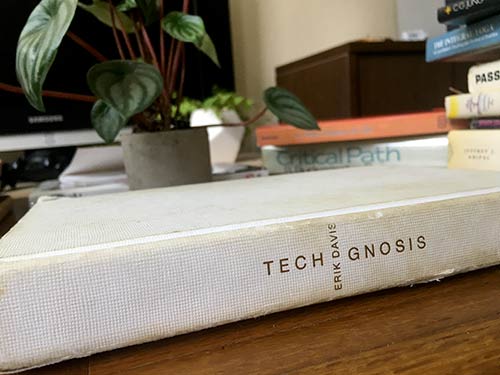Welcoming Jeremy Johnson to Revelore
 Jeremy Johnson is an editor, essayist, and culture writer. His work explores the borders of the human and non-human worlds, liminal spaces, and the imagination as a window into latent futures. He is the founder of Nura Learning, a conscious media platform promoting education as an agent of personal and cultural transformation. Jeremy has a Consciousness Studies MA from Goddard College, and is the current president of the International Jean Gebser Society. Jeremy is also a contributing editor to Reality Sandwich magazine, and his writing has appeared in publications such as OMNI, Evolve Magazine, Conscious Lifestyle Mag, Kosmos Journal, Evolve and Ascend, and Disinformation.
Jeremy Johnson is an editor, essayist, and culture writer. His work explores the borders of the human and non-human worlds, liminal spaces, and the imagination as a window into latent futures. He is the founder of Nura Learning, a conscious media platform promoting education as an agent of personal and cultural transformation. Jeremy has a Consciousness Studies MA from Goddard College, and is the current president of the International Jean Gebser Society. Jeremy is also a contributing editor to Reality Sandwich magazine, and his writing has appeared in publications such as OMNI, Evolve Magazine, Conscious Lifestyle Mag, Kosmos Journal, Evolve and Ascend, and Disinformation.
~
Jeremy, we are so thrilled that you’ve joined the Revelore team. You have chosen to become the Curator of Philosophies. What does that mean to you, and, really, how did you arrive here?
You’ll notice that it’s philosophies, plural. I’m convinced that, going forward, the only way to really think about our world is in an interdisciplinary way. Bridging myth and science, art and consciousness, mysticism and postmodern academia. Easier said than done, but its the cross-sections and crossroads of these philosophical approaches that interest me; where pop culture and “occulture” meet between the lines.
I’ve been interested previous gigs—such as editing and writing in literary counterculture spaces like Reality Sandwich—how these alternative communities pick up on the need for new modes of thinking and being in moments of historical crisis. Very often it’s these fringes, these liminal spaces, that inevitably contribute new ways of thinking that host culture inevitably adopts.
We look to the edges, and seek the numinous, for creative answers.
So I suppose that’s what led me here! I think the most powerful way we can explore these potential transformations in culture is through literature. We can write ourselves anew.
What are you excited about bringing to Revelore?
I’m very interested in celebrating consciousness culture as a literary culture, first and foremost. Books that make a movement.
Some of my own most important breakthroughs were reading books like Teilhard de Chardin’s The Phenomenon of Man or Jean Gebser’s Ever-Present Origin. Or even the novels of Ursula K. LeGuin and Philip K. Dick (fiction contains multitudes when it comes to the philosophies they espouse). Literature forms consciousness, forms literature. I’d love to help foster, in any small way, a consciousness culture that celebrates literature as the ultimate psychoactive substance.
Beyond that guiding orientation, I’m excited to work with writing that is thinking about the future. New paradigms. New philosophies. New ways of relating and being in the world that challenge us. Disrupt us. Force us to consider our human natures differently. You can find these new “philosophies” in the most interesting places. You just have to have your antennas tuned into the right frequency—if you will!
I’m also interested in works that consider the “evolutionary mysticism” of the human potential movement in a new light.

What inspired you to create Nura Learning? How does education connect to social transformation?
This really goes hand-in-hand with celebrating literary culture. When we read, we learn. Education is a kind of intensified process of reading, digesting, processing and ultimately re-writing themselves. I created Nura—along with my wife, Natalie Bantz, and my colleague and friend Henrietta Weekes—as a space to celebrate learning revisit the ideas of the human potential movement on a new page. To geek out and get passionate about amazing ideas that have changed my life and can hopefully do the same for others, in whatever way they need. It’s a space to learn about and explore subjects like consciousness studies, transpersonal studies, depth psychology, esotericism and occultism, astrology and a whole slew of subjects you’d normally find associated under the umbrella of consciousness culture. But the idea is to go deeper. I wanted to integrate critical thinking and let weird metaphysics mingle with critical theory. Integral Yoga meets Deleuze, meets the noosphere.
I was very inspired by historical consciousness culture institutions like Esalen in the United States, Findhorn in the UK, or Auroville in Pondicherry—and I wanted to create something of that energy for the Internet age. A distributed version of those “evolutionary” containers as we head towards an electronic, cyborg-infused planetary culture.
We’ll be doing as much collaboration with Revelore authors as we can—like hosting classes and geeking out about new books. Come learn with us.
So what are you reading right now, anyway?
I’m finishing up the Southern Reach Trilogy so I can get to Jeff VanderMeer’s latest book, Borne. It’s beautifully terrifying. I’ve developed an appetite for “weird lit” and “eco-horror.” So, if you find another title to add to the list, let me know!
I’m also on a semi-informal research stint looking at the 1970s and the human potential movement through its literature, so I’m reading Jeffrey Kripal’s Esalen and revisiting William Irwin Thompson’s Edge of History. There are those edges again.

~
This evening On Wednesday, August 9, Jeremy and the Nura Learning team are kicking kicked off their first course. Attendance is free and if you cannot make it live, anyone who signs up will get a recording. Head over to Nura Learning to find out more!
Last but note least, you may find Jeremy’s tweets at: @jdj_writes
- Welcoming Jeremy Johnson to Revelore - 2017-08-09
- Talking plants and publishing with Casandra Johns - 2017-08-04
